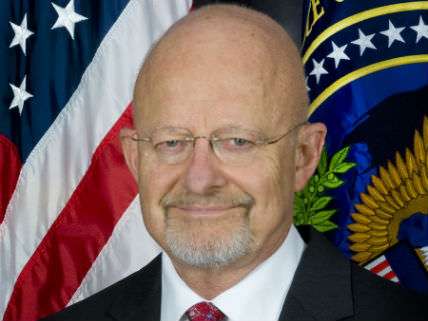Clapper Says His Denial of Mass Data Collection Was a True Statement, a Noble Lie, and an Honest Mistake. Pick One.

This week Director of National Intelligence James Clapper released a June 21 letter in which he apologized for his "clearly erroneous" answer to a question from Sen. Ron Wyden (D-Ore.) about mass data collection by the National Security Agency. This represents Clapper's third explanation for his failure to tell the truth, and for all I know he is coming up with a fourth even as I write. He might be better off if he picked one and stuck with it.
Here is the question that Wyden posed at a March 12 hearing before the Senate Intelligence Committee:
Last summer the NSA director was at a conference, and he was asked a question about the NSA surveillance of Americans. He replied, and I quote here, "the story that we have millions or hundreds of millions of dossiers on people is completely false."
The reason I'm asking the question is, having served on the [intelligence] committee now for a dozen years, I don't really know what a dossier is in this context. So what I wanted to see is if you could give me a yes or no answer to the question: Does the NSA collect any type of data at all on millions or hundreds of millions of Americans?
And here is Clapper's answer:
No, sir.
Wyden knew this was not true, because as a member of the intelligence committee he had been briefed about the NSA's then-secret database of all domestic telephone records, collected under a controversial interpretation of the PATRIOT Act. So Wyden gave Clapper another chance:
Wyden: It does not.
Clapper: Not wittingly. There are cases where they could inadvertently perhaps collect, but not wittingly.
Wyden: All right. Thank you. I'll have additional questions to give you in writing on that point, but I thank you for the answer.
Clapper's explanation for this misrepresentation has evolved since it first came to light as a result of the recent revelations about the NSA's surveillance programs. At first he said the exchange with Wyden was about email content, as opposed to telephone metadata. "What I said, " he told National Journal on June 6, "was the NSA does not voyeuristically pore through U.S. citizens' emails." Since Wyden asked about "any type of data at all," and since the word email was not even mentioned during the hearing, that description was clearly false. In an interview with NBC News two days later, Clapper effectively admitted that he lied to Wyden, saying he gave the "least untruthful" answer he could to a question dealing with classified matters. (If Clapper was concerned about revealing classified information during an open hearing, wouldn't declining to answer have been less untruthful?) In his June 21 letter, which is addressed to Senate Intelligence Committee Chairwoman Dianne Feinstein (D-Calif.), Clapper backs away from that admission, pleading honest confusion instead:
I have thought long and hard to re-create what went through my mind at the time. In light of Senator Wyden's reference to "dossiers" and faced with the challenge of trying to give an unclassified answer about our intelligence collection activities, many of which are classified, I simply didn't think of Section 215 of the Patriot Act. Instead, my answer addressed collection of the content of communications. I focused in particular on Section 702 of FISA [the Foreign Intelligence Surveillance Act], because we had just been through a year-long campaign to seek reauthorization of this provision and had had many classified discussions about it, including with Senator Wyden. That is why l added a comment about "inadvertent" collection of U.S. person information, because that is what happens under Section 702 even though it is targeted at foreigners.
That said, I realized later that Senator Wyden was asking about Section 215 metadata collection, rather than content collection. Thus, my response was clearly erroneous—for which I apologize. While my staff acknowledged the error to Senator Wyden's staff soon after the hearing, I can now openly correct it because the existence of the metadata collection program has been declassified.
Clapper implies that he was surprised by Wyden's question, and he states that his staff "acknowledged the error to Senator Wyden's staff soon after the hearing." Those claims seem inconsistent with this June 11 statement by Wyden (emphasis added):
When NSA Director Alexander failed to clarify previous public statements about domestic surveillance, it was necessary to put the question to the Director of National Intelligence. So that he would be prepared to answer, I sent the question to Director Clapper's office a day in advance. After the hearing was over my staff and I gave his office a chance to amend his answer. Now public hearings are needed to address the recent disclosures and the American people have the right to expect straight answers from the intelligence leadership to the questions asked by their representatives.
So did Clapper make an accurate statement, as he claimed in his June 6 interview with National Journal; give a deliberately misleading answer in the service of national security, as he claimed in his June 8 interview with NBC News; or give what he thought was an accurate answer to a question he mistakenly believed Wyden had asked, as he claims in his June 21 letter to Feinstein? All three of these things cannot possibly be true, and probably none of them is. Clapper's noble-lie explanation implies that he refused to acknowledge the NSA's telephone-record dragnet because it was classified; it would be more accurate to say the program was classified so that officials like Clapper would not have to acknowledge it.


Show Comments (112)